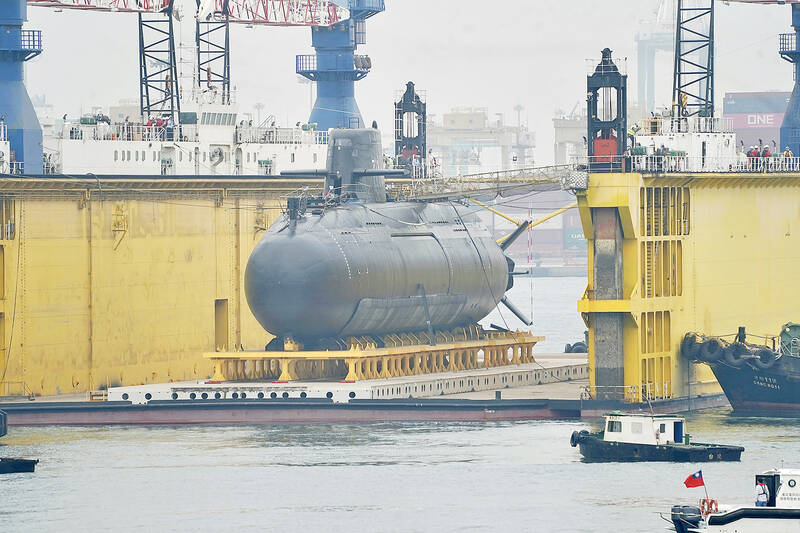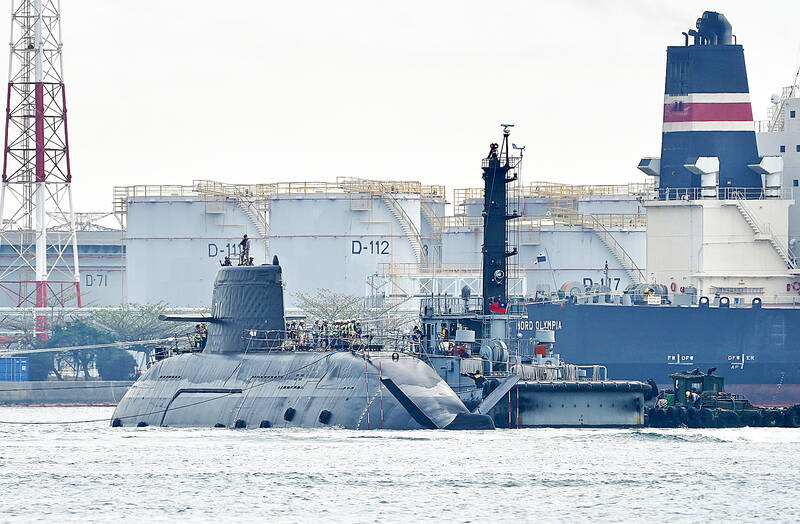The nation’s first domestically built submarine prototype, the Hai Kun (海鯤號), yesterday was transferred to a dry dock for final harbor acceptance tests.
The prototype has been undergoing harbor acceptance tests at the factory of shipbuilder CSBC Corp, Taiwan (台灣國際造船) in Kaohsiung since October last year after an unveiling ceremony in late September.
On Monday evening, the prototype was towed from the CSBC factory to nearby Jong Shyn floating dock No. 8 and then transferred to a nearby dry dock, where the final tests were being conducted.

Photo: CNA
As the submarine was being moved out of the factory to the floating dock, a large number of spectators, including news media, shot videos and photographs of the Hai Kun, which had only been seen publicly once before, at an unveiling event on Sept. 28 last year, during which the bow, torpedo tubes and other critical components were concealed beneath a national flag.
CSBC chairman Cheng Wen-lon (鄭文隆) said at the time the measure was taken so as not to reveal of confidential parts of the submarine for security reasons, pending further testing.
When the prototype was moved on Monday, many of the previously concealed parts were visible, including its intercept sonar, flank sonar array and torpedo tubes.

Photo: CNA
The military did not explain why those elements were revealed after previously being covered.
However, there were some parts, including the tail, that were shielded from view at last year’s ceremony and remained that way during the move.
Shu Hsiao-huang (舒孝煌) of government-funded think tank the Institute for National Defense and Security Research, said the submarine’s tail remained shielded because “enemy forces” could estimate the prototype’s underwater speed and acoustic fingerprint by observing the number of its propellers, their angles and structural designs.
Retired navy captain Jiang Hsin- biao (江炘杓) said that yesterday’s tests at the dry dock were meant to make sure the submarine’s actual displacement is consistent with its original design.
Among the tests to be conducted would be an inclining test that is performed to determine the ship’s stability and the coordinates of its center of gravity.
Other tests at the dry dock would focus on separately testing the submarine’s equipment, ventilation system and engine, before running a comprehensive test by connecting the systems together, Jiang said.
Only after successful completion of the tests would the prototype move on to sea acceptance tests, the military and CSBC said.
Huang Shu-kuang (黃曙光), the head of Taiwan’s Indigenous Defense Submarine program, previously told reporters that the prototype would complete both sets of tests before being delivered to the navy at some point before the end of this year.
In other news, among the first batch of 655 draftees for the new one-year conscription period who reported for training last month, 117 have signed up to serve in the volunteer military force, the Ministry of National Defense said yesterday.
The figure, higher than the number of draftees who signed up last year during the same period of their four-month conscription, shows that the conscripts find the military and their salaries agreeable, Deputy Minister of National Defense Po Horng-huei (柏鴻輝) said.
The starting salary for conscripts was increased to more than NT$20,000 a month from NT$6,510 after the government extended compulsory military service from four months to one year.

CHAOS: Iranians took to the streets playing celebratory music after reports of Khamenei’s death on Saturday, while mourners also gathered in Tehran yesterday Iranian Supreme Leader Ayatollah Ali Khamenei was killed in a major attack on Iran launched by Israel and the US, throwing the future of the Islamic republic into doubt and raising the risk of regional instability. Iranian state television and the state-run IRNA news agency announced the 86-year-old’s death early yesterday. US President Donald Trump said it gave Iranians their “greatest chance” to “take back” their country. The announcements came after a joint US and Israeli aerial bombardment that targeted Iranian military and governmental sites. Trump said the “heavy and pinpoint bombing” would continue through the week or as long

TRUST: The KMT said it respected the US’ timing and considerations, and hoped it would continue to honor its commitments to helping Taiwan bolster its defenses and deterrence US President Donald Trump is delaying a multibillion-dollar arms sale to Taiwan to ensure his visit to Beijing is successful, a New York Times report said. The weapons sales package has stalled in the US Department of State, the report said, citing US officials it did not identify. The White House has told agencies not to push forward ahead of Trump’s meeting with Chinese President Xi Jinping (習近平), it said. The two last month held a phone call to discuss trade and geopolitical flashpoints ahead of the summit. Xi raised the Taiwan issue and urged the US to handle arms sales to

BIG SPENDERS: Foreign investors bought the most Taiwan equities since 2005, signaling confidence that an AI boom would continue to benefit chipmakers Taiwan Semiconductor Manufacturing Co’s (TSMC, 台積電) market capitalization swelled to US$2 trillion for the first time following a 4.25 percent rally in its American depositary receipts (ADR) overnight, putting the world’s biggest contract chipmaker sixth on the list of the world’s biggest companies by market capitalization, just behind Amazon.com Inc. The site CompaniesMarketcap.com ranked TSMC ahead of Saudi Aramco and Meta Platforms Inc. The Taiwanese company’s ADRs on Tuesday surged to US$385.75 on the New York Stock Exchange, as strong demand for artificial intelligence (AI) applications led to chip supply constraints and boost revenue growth to record-breaking levels. Each TSMC ADR represents

Pro-democracy media tycoon Jimmy Lai’s (黎智英) fraud conviction and prison sentence were yesterday overturned by a Hong Kong court, in a surprise legal decision that comes soon after Lai was jailed for 20 years on a separate national security charge. Judges Jeremy Poon (潘兆初), Anthea Pang (彭寶琴) and Derek Pang (彭偉昌) said in the judgement that they allowed the appeal from Lai, and another defendant in the case, to proceed, as a lower court judge had “erred.” “The Court of Appeal gave them leave to appeal against their conviction, allowed their appeals, quashed the convictions and set aside the sentences,” the judges